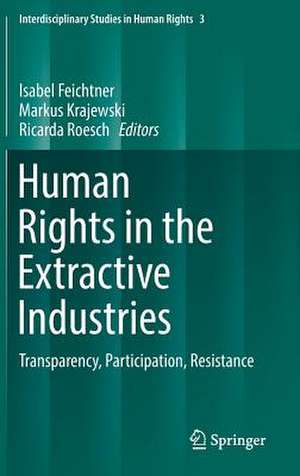Human Rights in the Extractive Industries: Transparency, Participation, Resistance: Interdisciplinary Studies in Human Rights, cartea 3
Editat de Isabel Feichtner, Markus Krajewski, Ricarda Roeschen Limba Engleză Hardback – 26 iun 2019
Preț: 1019.39 lei
Preț vechi: 1243.16 lei
-18% Nou
Puncte Express: 1529
Preț estimativ în valută:
195.12€ • 212.02$ • 164.01£
195.12€ • 212.02$ • 164.01£
Carte tipărită la comandă
Livrare economică 21 aprilie-05 mai
Preluare comenzi: 021 569.72.76
Specificații
ISBN-13: 9783030113810
ISBN-10: 3030113817
Pagini: 556
Ilustrații: X, 551 p. 6 illus., 5 illus. in color.
Dimensiuni: 155 x 235 mm
Greutate: 1 kg
Ediția:1st ed. 2019
Editura: Springer International Publishing
Colecția Springer
Seria Interdisciplinary Studies in Human Rights
Locul publicării:Cham, Switzerland
ISBN-10: 3030113817
Pagini: 556
Ilustrații: X, 551 p. 6 illus., 5 illus. in color.
Dimensiuni: 155 x 235 mm
Greutate: 1 kg
Ediția:1st ed. 2019
Editura: Springer International Publishing
Colecția Springer
Seria Interdisciplinary Studies in Human Rights
Locul publicării:Cham, Switzerland
Cuprins
Introduction.- Part One: Transparency.- The Extractive Industries Transparency Initiative (EITI) as a Human Rights Instrument: Potentials and Shortcomings.- United States Law and Conflict Minerals.- The 2017 EU Conflict Minerals Regulation: A Promising European Rite to Remove the Natural Resource Curse?.- Community Development Agreements as Tools for Local Participation in Natural Resource Projects in Africa.- Stabilization Clauses and Human Rights: The Role of Transparency Initiatives.- Improving Tax Strategy Transparency in the Extractive Industries Sector for the Advancement of Human Rights.- Part II: Participation.- The Evolving Duty to Consult and Obtain Free Prior and Informed Consent of Indigenous Peoples for Extractive Projects in the United States and Canada.- Asserting the Principle of Free, Prior and Informed Consent (FPIC) in Sub-Saharan Africa in the Extractive Industry Sector.- The Corporate Responsibility to Respect Consultation Rights in the Americas: How the Inter-American System Can Better Promote Free, Prior, and Informed Consent.- Free, Prior, and Informed Consent in the Philippines: A Fourth World Critique.- Norm Contestation and (Non-)Compliance: The Right to Prior Consultation and FPIC in the Extractive Industries.- State-Investor Contracts and Human Rights: Taking a Critical Look at Transparency and Participation.- Disruption and Institutional Development: Corporate Standards and Practices on Responsible Mining.- Part III: Resistance.- Taking Sides in Scientific Research? The Struggle for the Right to Participate in Public Decision-Making Related to a Mining Project in Brazil.- Building the Case for a Home-State Grievance Mechanism: Law Reform Strategies in the Canadian Resource Justice Movement.- Transnational Human Rights and Environmental Litigation: A Study of Case Law Relating to Shell in Nigeria.
Textul de pe ultima copertă
This book addresses key challenges and conflicts arising in extractive industries (mining, oil drilling) concerning the human rights of workers, their families, local communities and other stakeholders. Further, it analyses various instruments that have sought to mitigate human rights violations by defining transparency-related obligations and participation rights. These include the Extractive Industries Transparency Initiative (EITI), disclosure requirements, and free, prior and informed consent (FPIC). The book critically assesses these instruments, demonstrating that, in some cases, they produce unwanted effects. Furthermore, it highlights the importance of resistance to extractive industry projects as a response to human rights violations, and discusses how transparency, participation and resistance are interconnected.
Caracteristici
Discusses human rights in extractive industries comprehensively Includes case studies and examples from countries around the world Critically assesses potentials and limits of transparency, participation and resistance as strategies to address human rights violations












